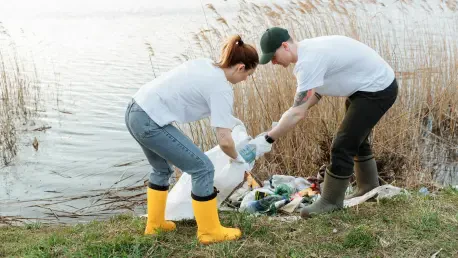Laurene Allen’s evolution from a concerned parent to a formidable advocate illustrates the power of grassroots activism in confronting environmental crises. Her journey began in Merrimack, New Hampshire, driven by a deep desire to provide a safe, nature-rich upbringing for her children. This mission took an unexpected turn when she found herself thrust into New England’s battle against pollution caused by PFAS, or per- and polyfluoroalkyl substances. These synthetic chemicals, which resist breaking down in the environment and human body, are widely recognized as “forever chemicals.” They pose a significant hazard due to their links to cancer and other health issues. Allen’s involvement not only sparked a movement in her hometown but also reverberated across the entire environmental landscape, highlighting the urgent need for systemic reform in addressing chemical contamination.
Discovery and Initial Response
Laurene Allen’s confrontation with the alarming issue of PFAS contamination began in March 2016 when she attended an eye-opening town meeting in Merrimack. The meeting brought to light that the town’s water supplies had been compromised by emissions from the nearby Saint-Gobain Performance Plastics plant, which was pivotal information that sent shockwaves throughout the community. The fact that these “forever chemicals” were lurking in their tap water, undetectable by taste or smell, led to a profound sense of alarm and distrust in the state’s measures to adequately address the threat. Unwilling to stand by, Allen resolved to delve deep into understanding the complexities surrounding the contamination while continuing her work as a clinical social worker. Her growing awareness of the gap between official regulatory assurances and the reality of the situation acted as a catalyst for her to take decisive action against the contamination to protect her community.
Faced with the daunting complexity of the problem, Allen immersed herself in learning about the chemicals and their impacts. This self-education was essential for her to comprehend the intricate nature of the contamination and its potential consequences. Recognizing that her journey wouldn’t be solitary, she began mobilizing her fellow residents to seek resolutions. Despite the technical and scientific challenges, she was undeterred, steadily strategizing how to effect meaningful change. Her efforts were rooted in a deep sense of justice and protection for her family and her community at large. She knew that full comprehension of the issue was necessary for accountability and solutions. By uncovering the nuances of PFAS, Allen positioned herself not only as a concerned citizen but as an informed advocate capable of challenging governmental and corporate narratives that downplayed the severity of the threat.
Grassroot Activism Emergence
From her individual resolution grew a collective movement when Allen founded Merrimack Citizens for Clean Water, transforming collective anxiety into organized action. The group’s inception marked a significant shift in how the community addressed the PFAS crisis, moving from isolated voices of concern to a unified front demanding change. Comprising passionate volunteers, the organization became a hub for collaboration, knowledge dissemination, and proactive dialogue aimed at holding polluters accountable. Members of the group engaged with scientists to comprehend the technical facets of PFAS chemicals, ensuring their advocacy was backed by empirical evidence. Additionally, they conducted thorough door-to-door surveys that revealed the correlations between contaminated water and the health issues experienced by local residents, further fueling their cause.
The organization’s multifaceted approach attracted attention and support, achieving key objectives by merging scientific expertise with grassroots activism. Members actively lobbied elected officials, urging them to recognize and address the escalating crisis. Despite facing criticism and skepticism from various quarters, Allen’s dedication never wavered. Her capacity to galvanize a broad coalition of stakeholders, including scientists, legislators, and local residents, underscored the power of communal determination. Her tireless campaigning and strategic initiatives led to a heightened awareness of the PFAS issue, not only in Merrimack but also at a statewide level, amplifying demands for legislative intervention. Recognition of her grassroots efforts and their tangible impact came with the prestigious Goldman Environmental Prize, awarded to Allen as an acknowledgment of her vital role in spearheading the fight against PFAS pollution.
Legal Victory and Ongoing Challenge
By June 2018, Allen’s relentless efforts culminated in a significant legal accomplishment. The pressure exerted by her and her allies led to a consent decree between Saint-Gobain and New Hampshire state authorities. This decree mandated that the company shoulder the costs of extending municipal water lines to residences reliant on PFAS-contaminated wells, alongside providing bottled water and filtration systems as interim solutions. The agreement embodied a critical milestone in the quest for clean water, instigating essential remedial actions that directly benefited the affected community. However, it also underscored the limitations of current regulatory mechanisms, highlighting unresolved aspects of the contamination crisis that required further attention and intervention. While the decree marked tangible progress, it did not entirely resolve the profound regulatory insufficiencies that enabled such widespread pollution to occur in the first place.
Besides addressing immediate health and safety concerns, the nature of the issue—rooted in complex industrial practices—underscored the need for a prolonged commitment to monitoring and regulatory enhancements. Allen recognized that this victory, although momentous, only scraped the surface of long-lasting change. The persistent presence of PFAS and the ongoing risks they posed required continuous advocacy and relentless focus on compelling both government entities and industry players to implement comprehensive solutions. This challenge necessitated Allen and her group’s sustained involvement in strategic advocacy and public dialogues, encouraging a broader societal understanding of the significant environmental and health risks posed by these substances. Addressing the regulatory gaps was essential for achieving long-term safety and protecting vulnerable populations from similar threats in the future.
Amplified Advocacy and National Reach
Despite localized successes, Allen remained acutely aware that the fight against PFAS contamination demanded national coordination. With an eye toward broader regulatory reform, she played a pivotal role in establishing the National PFAS Contamination Coalition. This coalition aimed to unify advocates from across 30 states, fostering a collective endeavor that could exert greater pressure on federal institutions to strengthen regulations concerning PFAS. This interstate alliance epitomized a shift from individual community struggles to a synchronized national movement, amplifying calls for tighter control over the manufacture and disposal of PFAS chemicals. Allen’s strategic foresight was instrumental in forging connections among diverse groups faced with similar contamination challenges, creating a network through which knowledge, resources, and advocacy techniques could be shared.
In 2023, Allen’s resolve faced a critical test when Saint-Gobain applied for a permit to continue its operations in Merrimack. Her opposition was unwavering, embodying the community’s enduring discontent with the status quo. The activism of Allen and the coalition members, driven by relentless energy and compelling evidence of PFAS dangers, created a tidal wave of local and national scrutiny around the company’s environmental practices. Her leadership was not just about dismantling immediate threats but transforming the underlying systems that allowed such threats to persist. A week after the permit’s initial approval, in a dramatic turn of events, Saint-Gobain announced plans to shut down its Merrimack operations altogether. This development was heralded as a significant victory for the community, reaffirming the power of organized activism to drive corporate accountability.
Broadening Advocacy Perspective
Reflecting on her journey, Allen recognized that her battle against PFAS was a microcosm of broader environmental and public health issues, prompting a necessary realignment of conventional approaches to tackling ecological problems. She stressed the importance of adopting a systemic perspective that accounts for the interconnectedness of environmental and human health, underscoring the crucial role of informed regulatory efforts that resonate with on-the-ground realities. Allen advocated for integrative strategies that encompass scientific, social, and legislative dimensions, directing efforts towards mitigating systemic risks associated with chemical pollution. This holistic approach seeks not only immediate solutions but also sustainable pathways to prevent future environmental challenges. Her vision of ecological stewardship calls for robust policy frameworks that reflect an understanding of the intricate balance between industrial progress and ecological stability.
With her retirement from clinical social work on the horizon, Allen plans to dedicate more of her time to advancing this integrative agenda, viewing it as her next chapter in making impactful contributions to environmental advocacy. Her focus is on driving policy reform and fostering collaborative partnerships that can translate research and activism into legislative change. By inspiring others, particularly the next generation of environmental advocates, she hopes to reinforce a global culture of sustainability and proactive management of ecological health. Recognizing that substantial change often emerges from grassroots endeavors, her advocacy continues to motivate action and awareness, bridging the gap between environmental realities and regulatory responses. It is a testament to her belief that, with concerted efforts, systemic change is not only possible but imperative for a healthier world.
Impact and Recognition
Laurene Allen’s journey into addressing PFAS contamination began in March 2016 at a revelatory town meeting in Merrimack. There, she discovered that emissions from the nearby Saint-Gobain Performance Plastics plant had tainted the town’s water supply with “forever chemicals” undetectable by taste or smell. The news sparked anxiety and skepticism about the state’s ability to adequately tackle this threat. Refusing to be a passive observer, Allen decided to explore the complexities of this pollution while juggling her work as a clinical social worker. Her realization of the discrepancy between official assurances and reality drove her to act, aiming to shield her community. Allen dove into understanding the chemicals’ complexities and mobilized residents to pursue solutions. Undeterred by scientific hurdles, she focused on making lasting changes rooted in justice and protection for her family and community. Armed with this knowledge, she emerged as an informed advocate, challenging narratives that minimized the threat’s severity.









